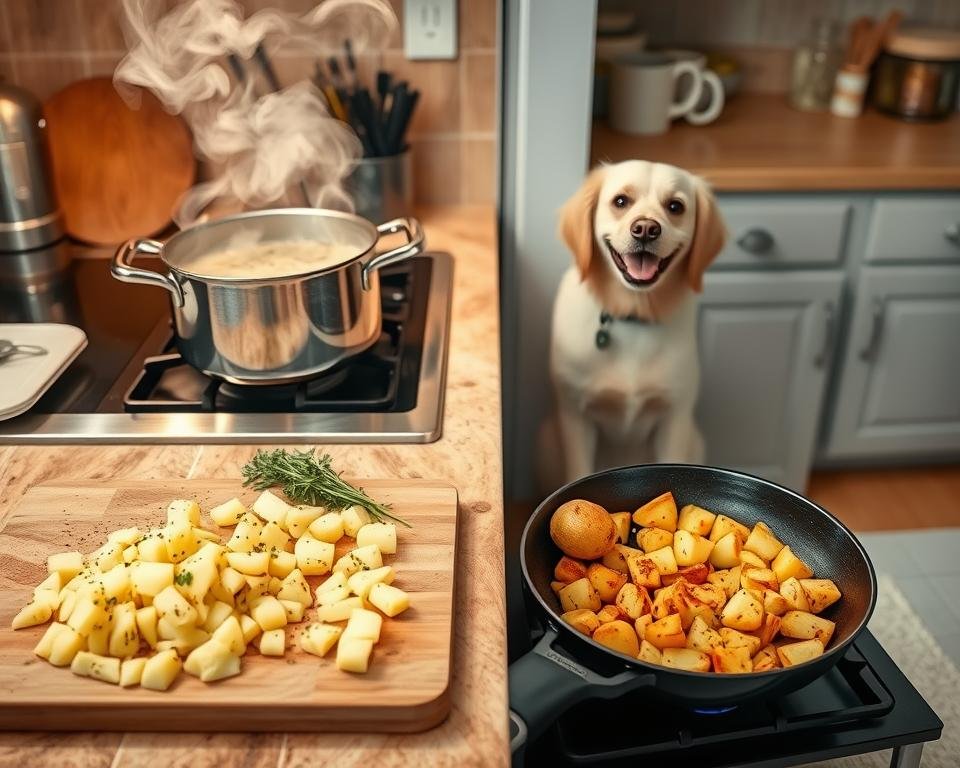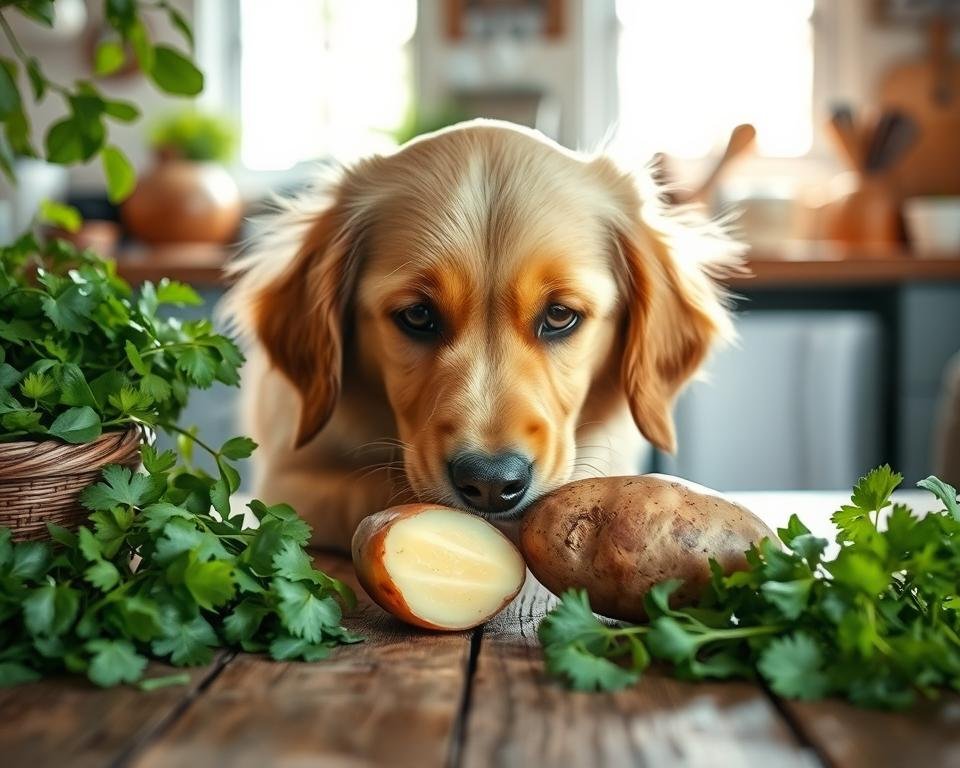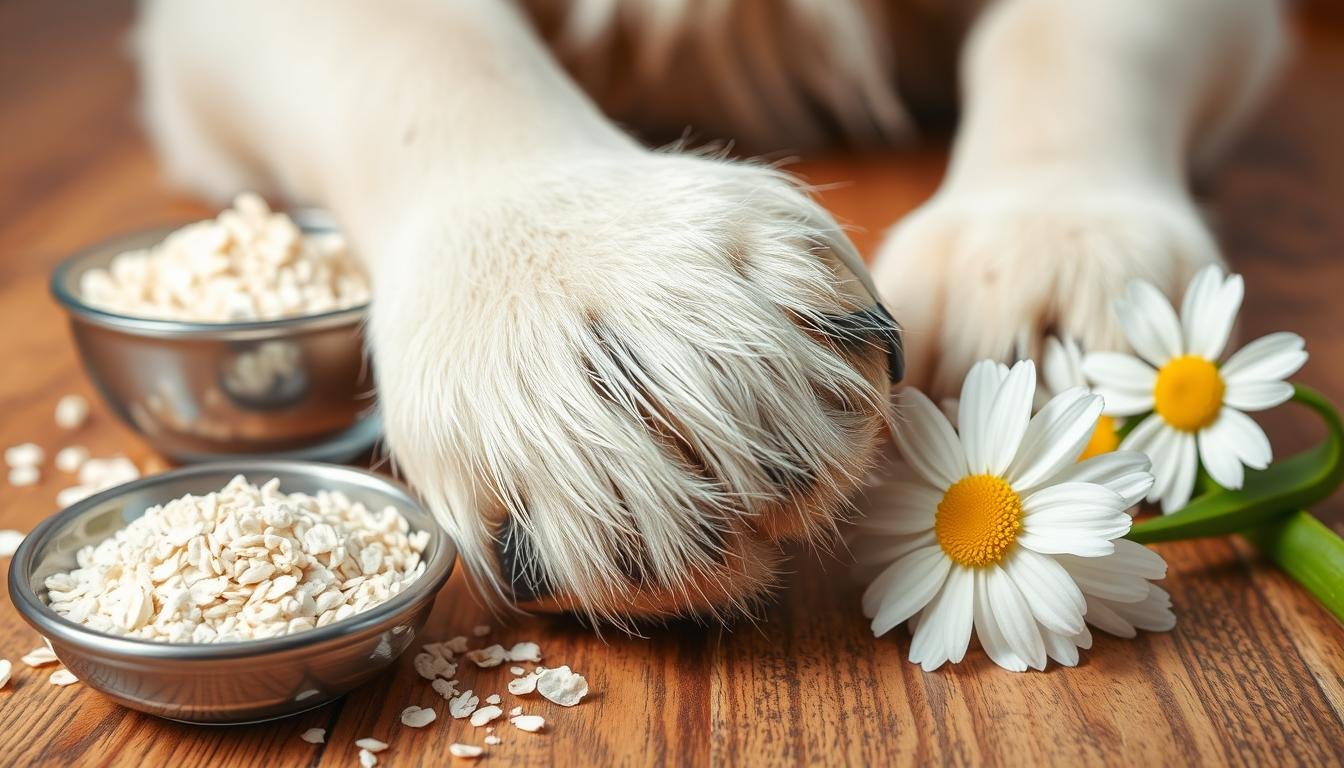Many pet owners wonder, can dogs eat potatoes? In this guide, we’ll look at the good and bad of potatoes for dogs. Potatoes can be a tasty treat, but it’s important to know how to prepare them safely. We’ll talk about if are potatoes good for dogs and how to add them to your dog’s diet.
It’s key to consider your dog’s health and any special needs they might have. This includes conditions like diabetes. We’ll give you tips on how to introduce potatoes safely.
With the right steps, you can confidently say, can dogs have potatoes. Let’s explore the world of potatoes and find out how to feed them safely to our furry friends.
Understanding Potatoes and Their Nutritional Value for Dogs
Potatoes can be a healthy part of a dog’s diet if cooked right. They have many nutrients that help dogs stay healthy. It’s important for dog owners to know how to give them potatoes safely.
Benefits of Potatoes
Potatoes are good for dogs in many ways. They are full of fiber, which helps with digestion. They also have potassium and important vitamins like C and B6.
These vitamins help a dog’s immune system and metabolism. But, dogs should only eat potatoes in small amounts. Too much can be bad for their health.
Vitamins and Nutrients Found in Potatoes
Potatoes have lots of good stuff for dogs. They are packed with:
- Vitamin C, which boosts the immune system
- Vitamin B6, which helps with metabolism
- Iron and magnesium, for energy and strength
Sweet potatoes are even better, with extra fiber and vitamins A and C. They also have antioxidants. But, it’s important to make sure any potatoes given to dogs are cooked well.
For more tips on adding potatoes to your dog’s diet, check out this useful article.
Can Dogs Eat Potatoes? An Overview
Many dog owners wonder, can dogs eat potatoes? The answer depends on how they are prepared. Dogs can eat potatoes if they are cooked and given in small amounts. Potatoes are a good source of nutrients, making them a healthy choice for dogs.
But, there’s a catch. Raw potatoes, green or sprouting, have solanine, which is toxic to dogs. So, it’s important to cook potatoes before giving them to your dog. Also, the skins can be hard for dogs to digest, leading to stomach upset. It’s best to remove the skins before serving.
Sweet potatoes are also safe for dogs when cooked and without skins. Mashed potatoes are okay, but without salt, butter, or seasonings. Dr. Danielle Bernal says potatoes are full of vitamins and minerals good for dogs.
While most dogs can have potatoes, dogs with diabetes need to be careful. Potatoes can raise their blood sugar. Also, avoid processed potato products like chips because they have too much salt and fat.
Cooked potatoes are sometimes in dog food because they are nutritious. For more on safe foods for dogs, check out this link.
Risks of Feeding Potatoes to Dogs
It’s important for pet owners to know the dangers of giving potatoes to dogs. Potatoes can be good for dogs if cooked right, but there are risks. The main dangers are raw or green potatoes and potato skins.
Toxic Components in Raw and Green Potatoes
Raw potatoes and green ones have solanine, which is toxic to dogs. This can cause symptoms like:
- Nausea
- Vomiting
- Diarrhea
- Cramps
- Dizziness
- Severe neurological problems
So, it’s a big no to giving dogs raw potatoes. Make sure potatoes are cooked well to remove the harmful parts.
The Dangers of Potato Skins
Even though potato skins aren’t toxic, they can upset a dog’s stomach. Their tough texture might cause:
- Gastrointestinal discomfort
- Intestinal blockages
Many wonder if dogs can eat potato skins safely. It’s safer to give them in small amounts, cooked well. Watch how your dog reacts to new foods, including potatoes, to keep them healthy.
How to Safely Prepare Potatoes for Dogs
It’s important to prepare potatoes safely for dogs. Boiling and baking are the best cooking methods. These methods avoid harmful ingredients like salt, butter, or spices. Always cook potatoes plain before giving them to your pet.
Cooking Methods for Dog-Safe Potatoes
Choosing the right cooking method is key for safe potatoes. Here are some good options:
- Boiling: Simple and effective, boiling potatoes eliminates toxins when done correctly.
- Baking: Allows for a soft texture, making it easier for dogs to eat.
- Mashed: Ensure mashed potatoes are free from seasonings and additives.
Remember, avoid seasoned potatoes like chips and fries. They have too much salt and fat.
Portion Control and Frequency of Feeding
Controlling portions is critical to avoid obesity and health issues. Treats, including potatoes, should not make up more than 10% of a dog’s daily calories. The right serving size depends on the dog’s weight, so check with a vet. Dogs with diabetes need to watch their potato intake closely.
Start with a small amount of potatoes to see if your dog reacts well. If done right, potatoes can be a tasty and healthy treat for your dog.

Alternative Potato Options for Dogs
Many dog owners wonder if potatoes are good for their pets. Can dogs eat sweet potatoes? Sweet potatoes are a better choice, packed with vitamins A and C. These nutrients boost your dog’s immune system and help with digestion.
Sweet potatoes are a top pick for dog owners. They’re full of antioxidants and fiber, which help with digestion and overall health. Giving your dog sweet potato fries can be a tasty treat, as long as they’re baked without salt or oil.
It’s key to mix up your dog’s diet. Try adding dog-safe veggies like carrots, green beans, and peas. This keeps meals interesting and ensures your dog gets all the nutrients they need. If you’re unsure about what to feed your dog, talk to your vet. For more info on safe foods, check out this guide: Potatoes and Pooches.
Conclusion
The question of whether dogs can eat potatoes is complex. Dogs can have plain, baked potatoes in small amounts. But, it’s important to know the dangers of raw potatoes and their skins.
These parts have harmful substances that can harm your dog. A diet that meets your dog’s needs is key.
Adding sweet potatoes to your dog’s diet can be beneficial. They are full of fiber, vitamins, and antioxidants. When adding potatoes to your dog’s food, make sure they are prepared safely.
It’s also important to avoid harmful toppings. This guide helps pet owners make healthy choices for their pets.
Knowing what your dog needs for a good diet is important. It makes mealtime better for them. For more tips on healthy dog food, check out this resource: healthy feeding practices.
By following these tips, your dog can live a happy and healthy life.
FAQ
Are potatoes good for dogs?
Yes, cooked potatoes can be good for dogs. They provide nutrients and energy. But, they should be given in small amounts and without harmful additives.
Can dogs have potatoes regularly?
No, potatoes shouldn’t be a regular part of a dog’s diet. They can be an occasional treat. Always watch your dog’s overall health and nutrition.
Can dogs eat raw potatoes?
No, raw potatoes are not safe for dogs. They contain solanine, which can cause stomach problems and other health issues. Always cook potatoes before giving them to your dog.
Can dogs eat potato skins?
It’s best to avoid giving dogs potato skins. They can be hard to digest and may cause discomfort or blockages.
What are the benefits of feeding potatoes to dogs?
Potatoes give dogs carbohydrates for energy and fiber for digestion. They also have vitamins C and B6, which are good for their health.
What cooking methods are best for preparing potatoes for dogs?
Boiling or baking potatoes without salt, butter, or spices is best. This makes them safe and healthy for dogs.
How can I ensure my dog gets the right portion of potatoes?
It’s important to control portions. Serve sizes should match your dog’s weight. Treats should not be a daily part of their diet.
What are healthier alternatives to regular potatoes for my dog?
Sweet potatoes are a better choice, with more nutrients and vitamins. Other safe vegetables can also add variety to your dog’s diet.
Should I consult my veterinarian before introducing potatoes to my dog’s diet?
Yes, it’s wise to talk to your vet. This is true if your dog has health issues or if you’re changing their diet a lot.



